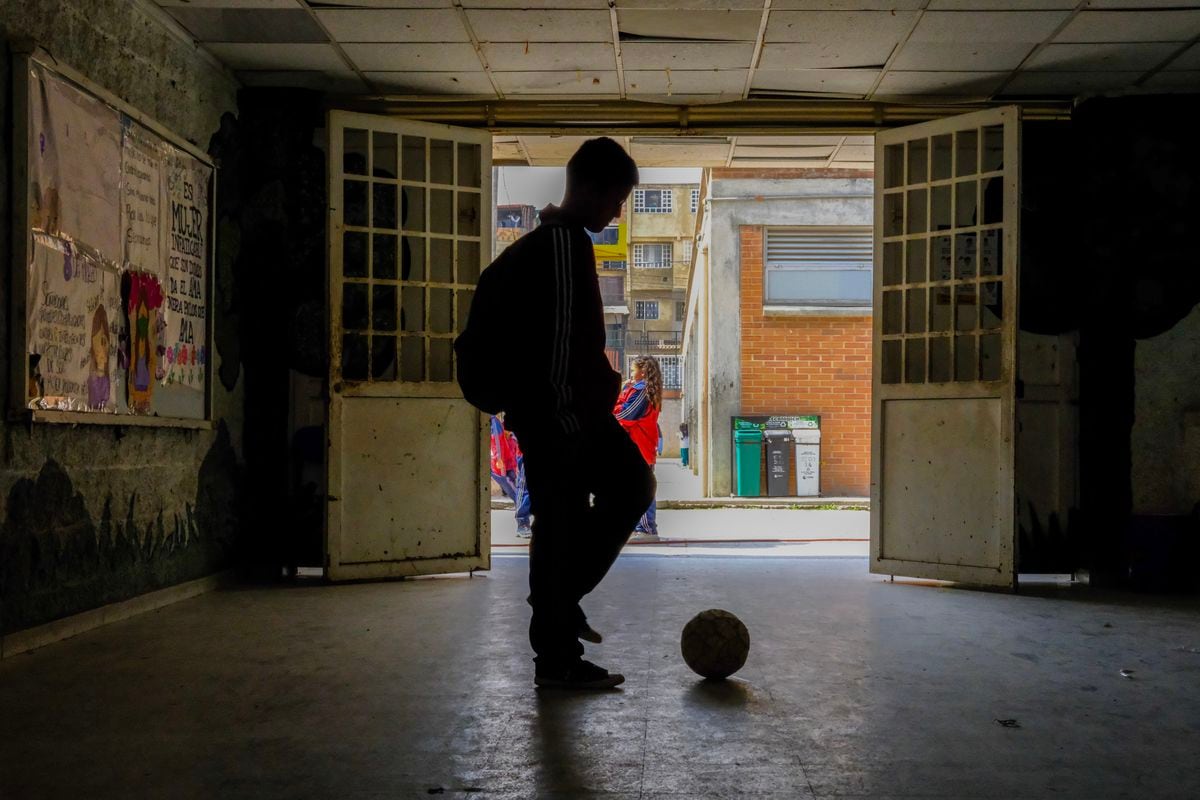Biases condition our perception of reality. A very shared one leads to think that the new generations are worse. That today's young people are lazier, more fragile and less savvy than previous generations. If that were true, we would live in an apocalyptic spiral that, as history has taught, is not a constant. "I don't think we're any less hardworking," says Paola Martinez, 21. Most of last year she was unemployed, so she was part of the 12.7% of young people who neither studied nor worked in Spain, according to Eurostat. This is a high figure compared to other European countries (the average is 11.7%), but it has improved a lot in recent years, reaching the lowest since records began in 2000. "I will be in that statistic, they can call me a nini, but I assure you that I have done everything I can to work. I was looking for work in many places and they didn't call me. I want to earn a salary," adds Martinez.
This rate, which measures the proportion of people aged 15 to 29 who neither study nor work, peaked in 2013 (22.5%). Since then it has experienced a gradual decline that was only interrupted in 2020, the year of the pandemic. 12.7% of Spain, one tenth less than in 2007, is far from the countries with the worst records, such as Romania (19.8%), Italy (19%) or Greece (15.4%), but even more of those with better figures: Malta (7.2%), Sweden (5.7%) or the Netherlands (4.2%). Like almost all statistics related to employment, it is worse among Spanish women (13.3%) than among Spaniards (12.1%), although the gap is smaller than at European level (10.5% them, 13.1% them).
The Secretary of State for Employment, Joaquín Pérez Rey, celebrates these data and sends a message to previous governments, in conversation with EL PAÍS: "It is very good news, but we still have to continue improving. I believe that there are no young NEETs, but NEET governments that did not pay the slightest attention to the integration of young people into employment. They paid for it by stigmatizing an entire generation." The Secretary General of Vocational Training (FP) of the Ministry of Education, Clara Sanz, makes a similar reflection: "Young people have often been criminalized, describing them as few workers, but when the perspective is changed and people are prioritized with respect to economic growth, unlike during the brick bubble, different results are obtained. "
Ana Cristina Ruiz, professor in the Department of Social Psychology, Social Work and Social Services at the University of Malaga and author of the doctoral thesis Ninis: youth and social exclusion (2019), indicates that the decrease in the proportion of NEETs has to do with the decrease in youth unemployment in recent years, "although the figure continues to be very worrying". Spain registers the second worst statistic in Europe, 29.3%, more than double the average (14.5%) and only behind Greece. María José Gómez Torres, co-author of a study on NEETsand professor in the Department of Didactics and Educational Organization at the University of Seville, agrees that she considers key "the role played by political initiatives deployed in recent years, such as labor reform, with changes that affect the quality and duration of contracts."
Pérez Rey also mentions the labor reform as one of the elements that has improved this statistic: "Before, young people and stability were like water and oil. It was an unusual element to find a young man with an indefinite contract. Now it has been nipped in the bud with that, which led to increased turnover and excessive exposure to temporality." According to the Active Population Survey (EPA), 28.2% of wage earners aged 25 to 29 have a temporary contract, compared to 42.3% in the first quarter of 2022. The drop is also significant from 16 to 19 years (from 79.3% to 61.3%) and from 20 to 24 years (from 64.5% to 46.7%). "We have benefited greatly from the slowdown in temporary hiring," reflects Eduardo Magaldi, spokesman for the UGT youth organization, RUGE.
The unemployment data have not improved so much, according to the EPA: of the three age groups mentioned, only the rate of 25 to 29 years has fallen (from 18.3% to 17.1%) in the last year. But the data of Registered unemployment of under 25 years of age do reach minimums, with only 188,403 in May, the lowest figure in the historical series. Pérez Rey also highlights that in both 2021 and 2022 the Ministry of Labour obliged the autonomous communities to dedicate 600 million euros of active employment policies exclusively to young people.
Beyond employment, experts consider changes in training essential to understand the fall in the proportion of NEETs. "This decrease is given by a drop of almost 11 points in the last decade of early school leaving in Spain," says the professor at the University of Malaga. This statistic includes the proportion of people aged 18 to 24 who do not complete the second stage of secondary education (intermediate vocational training, basic or baccalaureate) and do not follow any type of training. "Within our education system, it is worth highlighting measures such as the implementation of basic vocational training and also the rise of vocational training, especially dual vocational training," insists Gómez Torres.
Sanz believes that his ministry has managed to "transfer the perception that vocational training is one of the best ways to find employment." "Everyone," he continues, "knows someone who has managed to enter the labor market or re-engage thanks to VET." We still have to wait for consolidated data to know the effect of the Vocational Training law approved in 2021, which most unions and employers applaud, but before that there was already an acceleration in registrations, of 29.8% from 2017 to 2022. "We have entered a dynamic that we must settle and extend," adds Sanz. The confederal secretary of Youth of CC OO, Adrià Junyent, believes that for this objective to be met "it is necessary to guarantee that there are places for all those who want to study", and refers to cases such as the Community of Madrid, where more than half of the applicants were left without a place last September. "You can't sip and blow. You can't complain about NEETs and not make enough VET places available."
History of the Ninis
All experts agree in pointing to the educational abandonment to work in construction before the Great Recession as the germ of this problem. "Many people stopped studying because they could receive salaries of up to 3,000 euros if they went to the construction site. When they lost their jobs, there were no other jobs or training offer for them," says Junyent, like Sanz: "Then there was so much abandonment because it did not matter to sacrifice the professional future of these young people. That was a mistake we continue to pay for." Gómez Torres believes that that crisis left its mark on the collective conscience: "It led young people to stop considering early school leaving as a wise option."
The exponential increase in youth unemployment and school dropouts at that time installed a very negative image "almost generational", says Magaldi. "The media has had a lot to do with it, especially those that showed a very distorted image of these unemployed young people, as if none of them wanted to work," adds Junyent. "Society presents a stigma towards this group due to the great ignorance of the phenomenon. It has been accepted the construction of the social representation of the profile of young NEET as a young person, parasitic of the system, who does not want to study or work when the phenomenon is much more complex, "adds the professor at the University of Malaga.
Gómez Torres assures that this stigmatization, at a global level, began in the eighties in the United Kingdom, with reforms that meant "the loss of recognition of the status of unemployed, and with it the suppression of its corresponding subsidy, to young people aged between 16 and 18 years who were not registered in any of the main categories that determined the situation of the underage active population. " Decades later, "all the members of the NEET category are considered idle and apathetic young people, ignoring the current political, social and economic circumstances, very different from those that initially gave name to this typology of young people," adds the professor at the University of Seville.
In her doctoral thesis, Ruiz proposes a classification to avoid this confusion: the vocational NEET, those who voluntarily neither study nor work, among whom she differentiates between the "well-off", those whose families can afford this situation, and those who do not have that economic support and who "survive socially"; the NEET result of the educational system, caused by the lack of correspondence between "curriculum and expectations", "difficulties in social relations" or a "bad or non-existent orientation and personal projection"; and the NEET excluded from the labour market, one whose qualification does not correspond to demand, either due to underqualification or overqualification, or who does not have the required experience.
A waiter in Ibiza, last spring. Zowy Voeten (Getty Images)
"The essential characteristic that defines the NEET category," continues Gómez Torres, "is its marked heterogeneity. Under this label are different groups of young people with the common circumstance of being without studying or working at the time of conducting a demographic survey. " The scenarios are multiple: "Those who do not want to continue studying, nor do they want to work; those actively seeking employment after completing their studies; those who must devote themselves to caring for their dependent relatives; those who prepare competitive examinations, entrance exams to the State security forces or the army; those who study languages; the disabled, sick, injured or convalescent; those who have taken time to decide on their future; those who volunteer or travel to see the world...".
Neither of the two experts dares to affirm which of these groups, of such heterogeneous collective, is the majority. "There is no disaggregated data according to the characteristics and circumstances in which they are found," says Ruiz. But both she and Gómez Torres agree that it is unfair to reduce him to a group of lazy people. "What I see in my group of friends is that people who neither study nor work are looking for a job in anything," says María Zawadzki, 26, as she leaves the employment office in Alcalá de Henares (Madrid). He has just finished a computer science FP, the same training cycle of Álex Crespo and Cristian Ruiz, friends of 21 years. "I always tell my family, I want to work in anything, but so far I have not had luck. Of course I know some children who don't do anything, but they are a minority," says Crespo. Another common scenario is that of María de la Caridad Rodríguez (19 years old), who has just arrived in Spain from Cuba: "They have just given us the DNI because we are returned Spaniards. I've thrown a lot of resumes and I hope they call me quickly because the money is needed."
That people like these are labeled lazy, Junyent says, is a symptom of "ageism." "There is a discourse that builds an idea of young people that does not correspond to reality, a constant infantilization that serves to justify jobs in worse conditions," says Migaldi. This discrimination also has direct effects on mental health, according to the university professors consulted. "People who belong to the NEET category face, among other aspects, the loss of socio-labor opportunities, limitations in access to services and social advantages, and physical and mental health problems that can lead to episodes of low self-esteem, insecurity, disaffection, dependencies and juvenile delinquency," says Gómez Torres. "They are in a situation of vulnerability due to the lack of two of the main attributes that are part of the socialization process of individuals: training through the educational system or the performance of a job within the labor market," Ruiz insists.
Martínez, another of the young women who leave the employment office of Alcalá, is very happy because she will soon return to the labor market. "I have worked as a cleaner, receptionist and now I will be in administration. The truth is that I appreciate the opportunity. Let's see if that's how we pull forward and take a run."
Follow all the information of Economy and Business on Facebook and Twitter, or in our weekly newsletter
Subscribe to continue reading
Read without limits
Read more
I'm already a subscriber















